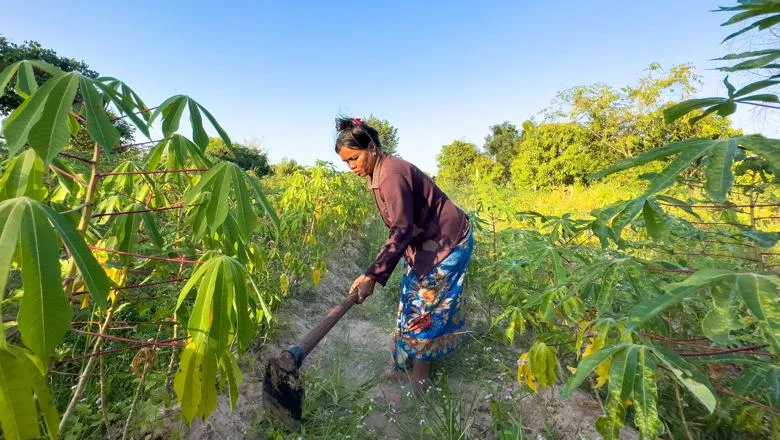The paper, co-authored by King's academics, critically examines green finance and ways microfinance contributes to climate precarity and harm for farmers in Cambodia.

A recent paper co-authored by King's academics argues that microfinance, often projected as a means of coping with climate risk, in fact contributes to farmers in Cambodia being in greater debt and more vulnerable to climate change.
Dr Nithya Natarajan (Department of International Development) and Professor Katherine Brickell (Department of Geography) are co-authors on the open access paper 'Depleted by Debt: "Green" Microfinance, Over-Indebtedness, and Social Reproduction in Climate-Vulnerable Cambodia' published in Antipode.
The paper examines the impact of microfinance in Cambodia, a country that is vulnerable to the effects of climate change and dependent on farming for livelihood. The study notes that overall temperatures in the region have increased by 0.9 degrees Celsius since 1960, particularly affecting agricultural occupations.
Microfinance is often presented in development policy as an instrument that can help the poor and vulnerable cope with the risks of climate change, adapt and recover. In Cambodia, farmers are increasingly taking microfinance loans to finance agriculture work, diversify their livelihoods, migrate nationally and internationally, and to pay for healthcare, food and housing.
Based on field research and mixed-method data, the authors argue that instead of boosting farmers' ability to cope with climate-related challenges, the indebtedness from microfinance loans simply delays the harmful effects of climate shock.
[Microfinance loans] are often the catalyst for other often harmful coping strategies to ensure repayment, pushing households to borrow and work more, sacrifice food quality and quantity, erode and sell their assets, including land, and even quit farming.
Professor Katherine Brickell, Professor of Urban Studies
Across the three villages studied, 12.5% and 9.1% of surveyed indebted participants said the last time they borrowed from a microfinance institution and an informal moneylender respectively was partly to repay other loans.
The study notes that members of households had to take up additional, often physically intensive jobs to repay debts owed to microfinance institutions. In some cases, this was against healthcare recommendations from professionals, harming their health.
We contend that such sacrifices ultimately erode borrowers' already-limited resources and undermine their capacity to adapt to a changing climate in the longer term.
Professor Katherine Brickell, Professor of Urban Studies
The paper is based on research conducted between 2020-22 in villages across provinces in Cambodia including the capital, Phnom Penh.
The findings are part of the research project: 'Depleted by Debt? Focusing a Gendered Lens on Climate Resilience, Credit, and Nutrition in Translocal Cambodia and South India'. The project examines the relationship between climate change, debt, health, and nutrition in Cambodia and India.








